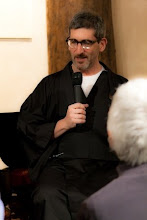“From the Bottom Up” by me, a short piece for a general audience published in Tricycle, 2006.
These two books are easy to find and order on line and are both quite clearly written - very good for lay people with only basic understandings of science:
“Complexity: Life at the Edge of Chaos” by Richard Lewin
(This one opens and focuses alot on sociology/anthropology type studies so if those are of interest...)
“Emergence” by Stephen Johnson
“Emergence” by Stephen Johnson
(This one has the fullest, niftiest explanation of ant colonies, my fave example, but eventually winds up focusing on the World Wide Web - not such a keen point of interest for me, but others may find it fascinating)
For New Yorkers and those who love cities:
"The Death and Life of Great American Cities" by Jane Jacobs
Before there were words and concepts for complexity theory, she intuited all of it by looking closely at the nature of cities, particularly New York. A beautiful classic.
For hardcore science geeks:
"The Elegant Universe" by Brian Greene
(Pulitzer Prize! Quantum theory and string theory as simply and clearly written as your ever likely to find it - but it ain't for those who are shy about science)
"The 30 Years That Shook Physics" by George Gamow
(Written decades ago, this is my favorite book on quantum theory - the history of its development, the wacky physicists involved, and the math. The math, in particular, makes this very non-trivial reading. Only brave it if you have a significant background in mathematics and if your heart takes wing when someone mentions the Pauli Exclusion Principle)
How our bodies organize themselves (for science nerds, mildy hardcore):
"Cell doctrine: Now you see it, now you don't" also by me:
"Modern biology and medicine see the cell as the fundamental building block of living organisms, but this concept breaks down at different perspectives and scales." This is piece is very short, one page.
On "Post-Modern Biology", also by me.
"Cell doctrine: Now you see it, now you don't" also by me:
"Modern biology and medicine see the cell as the fundamental building block of living organisms, but this concept breaks down at different perspectives and scales." This is piece is very short, one page.
On "Post-Modern Biology", also by me.
AND
For those who prefer to listen than to read, here's a podcast version of this stuff from Upaya's Zen Brain retreat in 2008. I'm told it works even without the accompanying powerpoint.
I will be giving a version of this talk on February 17 at Om Yoga Center, click here for info:

Can't believe i didn't mention Jane Jacobs classic, but its now part of the recommended readings list - particularly for those interested in sociology, urban studies, or just in love with being New Yorkers... Before people had fully developed theories of complexity she intuited it all.
ReplyDeleteLikewise James Lovelock and his Gaia Hypothesis, i.e. how the earth and everything in it - organic and inorganic - forms a single, large, self regulating organisms. Just not sure what to recommend of his, as his latest books are so grim, such as "the changing face of gaia" and "revenge of gaia." I mean things are bad, yes, but i'm not sure these are the messages i want to recommend to you all right now. Anyone have good recommendations regarding Gaia?